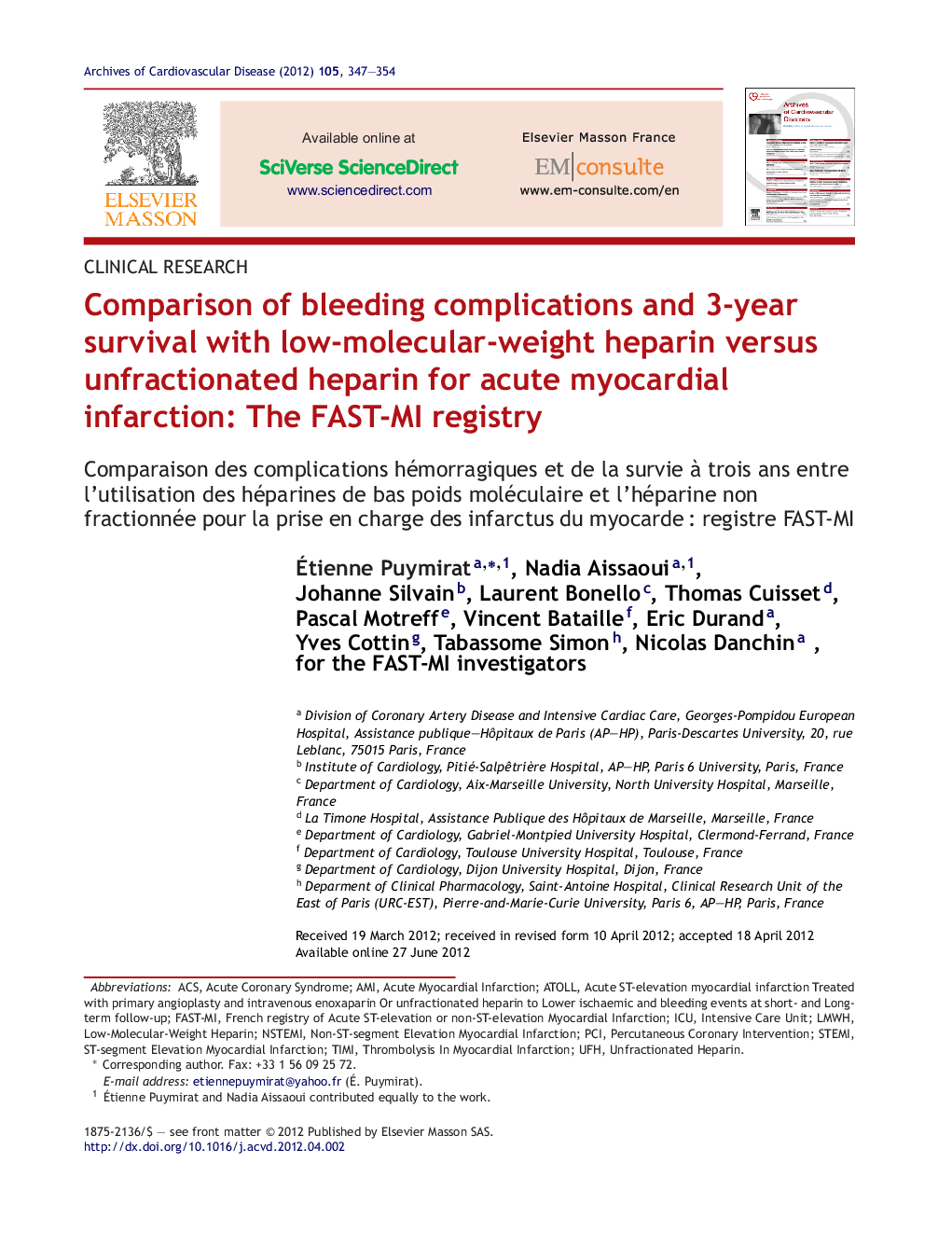| کد مقاله | کد نشریه | سال انتشار | مقاله انگلیسی | نسخه تمام متن |
|---|---|---|---|---|
| 2889389 | 1574373 | 2012 | 8 صفحه PDF | دانلود رایگان |

SummaryBackgroundRecent clinical studies suggest that low-molecular-weight heparin (LMWH) could be an effective and safe alternative to unfractionated heparin (UFH) for patients with acute myocardial infarction (AMI).AimsTo assess the impact of anticoagulant choice (LMWV vs UFH) on bleeding, the need for blood transfusion and 3-year clinical outcomes in AMI patients from the FAST-MI registry.MethodsFAST-MI was a nationwide registry compiled in France over 1 month in 2005, which included consecutive AMI patients admitted to an intensive care unit less than 48 hours from symptom onset in 223 participating centres.ResultsA total of 2854 patients treated with heparins were included. The risks of major bleeding or transfusion (3.0% vs 7.0%) and in-hospital death (3.2% vs 9.2%) were lower with LMWH compared with UFH, a difference that persisted after multivariable adjustment (odds ratio [OR] 0.51, 95% confidence interval [CI] 0.34–0.76 and OR 0.53, 95% CI 0.37–0.76, respectively). Three-year survival, and stroke and reinfarction-free survival risks were also higher with LMWH compared with UFH (adjusted hazard ratio [HR] 0.73, 95% CI 0.61–0.87 and HR 0.73, 95% CI 0.62–0.85, respectively). In two cohorts of patients matched on propensity score for receiving LMWH and with similar baseline characteristics (834 patients per group), major bleeding and transfusion rates were lower while the 3-year survival rate was significantly higher in patients receiving LMWH.ConclusionOur data suggest that the use of LMWH in AMI patients may have a better benefit/risk profile than UFH, in terms of bleeding, need for transfusion and long-term survival.
RésuméContexteLes dernières études cliniques suggèrent que les héparines de bas poids moléculaires (HBPM) représentent une alternative sûre et efficace à l’héparine non fractionnée (HNF) pour la prise en charge des patients avec un infarctus du myocarde (IDM).ObjectifsÉvaluer l’impact des HBPM par rapport à l’HNF sur les saignements et le devenir des patients présentant un IDM à partir du registre FAST-MI.MéthodesFAST-MI est un registre national ayant inclus au cours d’un mois fin 2005 les patients ayant présenté un IDM au sein de 223 centres participants. Nous avons évalué l’impact des HBPM sur les saignements, les transfusions et la survie à trois ans.RésultatsAu total, 2854 patients traités par héparine ont été inclus. Le risque de saignement majeur ou de transfusion (3,0 % vs 7,0 %, p < 0,001) et de décès intra-hospitalier (3,2 % vs 9,2 %, p < 0,001) étaient significativement moins élevés avec les HBPM qu’avec l’HNF ; résultats confirmés sur les analyses multivariées (OR 0,51, IC 95 % 0,34–0,76 et OR 0,53, IC 95 % 0,37–0,76, respectivement). L’utilisation des HBPM était associée de façon significative à une meilleur survie à trois ans et à la survenue de moins d’événements cardiovasculaires majeurs (décès, infarctus, accident vasculaire cérébral) comparée à l’HNF (HR 0,73, IC 95 % 0,61–0,87 et HR 0,73, IC 95 % 0,62–0,85, respectivement). Sur deux cohortes de patients appariés avec un score de propensité (834 patients par groupe), les patients traités par HBPM avaient significativement une meilleure survie à trois ans et moins de saignements majeurs et de transfusions.ConclusionCette étude démontre que l’utilisation des HBPM chez les patients présentant un IDM est associée à une diminution des saignements, des transfusions et à une meilleure survie comparée à ceux traités par HNF.
Journal: Archives of Cardiovascular Diseases - Volume 105, Issues 6–7, June–July 2012, Pages 347–354